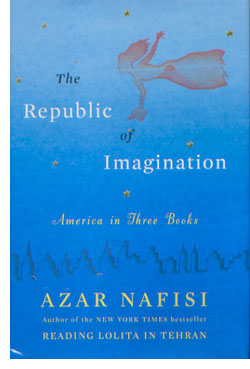 |
 |
 Azar Nafisi
Azar Nafisi
The Republic of Imagination: America in Three Books
Viking Penguin/Penguin Group
US Hardcover First Edition
ISBN 978-0-670-02606-7
Publication Date: 10-21-2014
338 Pages; $28.95
Date Reviewed:11-16-2014
Reviewed by: Rick Kleffel © 2014
Index:
Non-Fiction
Reading is an artistic experience, one that requires a real, learned skill on the part of the reader. Anyone can quickly become a master reader. It's a learn-by-doing skill. Better still, as readers we are all collaborating on our art with the writers we read. Azar Nafisi is a superb writer and reader. In her new book, 'The Republic of Imagination: America in Three Books,' Nafisi makes use of both skills to give her readers a leg up. It's learn-by-doing squared.
The book is divided into five sections. The introduction is a rabble-rousing call-to-arms for readers, the sort of thing that will have you toting the book into the presence of the nearest human so that you can read it aloud. If humans are unavailable, pets or the Internet may suffice. What Nafisi does is to expertly frame her personal experiences in the context of larger questions. She begins the book with an anecdote from a book tour, and spiral out from that kernel to craft truly uplifting prose about import and necessity of the reading experience.
Mark Twain's 'Huck Finn' was the impetus for starting the book in the first place, but she found that she had to bin her critical exegesis for something more personal. In the segment of the book covering Twain's masterpiece, she brings readers into her life and the life of a close friend from Iran. Their experiences in democracy and theocracy are refracted in the themes and language of Twain's novel. It'd a moving, intense, moody essay on the import of free speech and how closely freedom of thought and freedom of reading – and imagination – are bound.
She next examines 'Babbitt' by Sinclair Lewis. As with any book she mentions, whether you've read it or not, Nafisi will have you grabbing a copy pronto – and one trusts that you'll be purchasing any new copy from an independent bookstore. 'Babbitt' becomes a stepping-stone for a discussion on the necessity for the so-called "liberal" education, as opposed to the vocational model that's being foisted on a populace trapped in a seemingly permanent economic downturn.
Carson McCullers' 'The Heart is A Lonely Hunter' inspires the story of a friend of hers who lost his way. Nafisi comes to edge of breaking the reader's heart while e3xploring the human heart and the need for connection that McCullers captures with such power and precision. This leads to an epilogue about James Baldwin that evokes his presence in the world of our imaginations.
Nafisi never misses a step in 'The Republic of Imagination.' She makes sure that the writing and the stories she tells are engaging, but she does so while telling a bigger story about readers and reading to those reading the book. There's more than a bit of literary recursion to be found here. Readers will find themselves lost in her stories only to find themselves part of those stories. Reading, which is so often portrayed as a solitary experience becomes, in Nafisi's vision, a very public experience. We all belong to a country that has no borders beyond those we allow. Everyone can open a book and create their own Republic of Imagination. Set your eyes to the page and let the language take you where you desire to go.
|
 |
|
|
 |
| |
Review Archive
All Reviews alphabetized by author.
General Fiction
Non-Genre, general fiction and literature.
Horror
Supernatural fiction, supernatural horror and non-supernatural horror.
Science Fiction
Science fiction, science fantasy, speculative fiction, alternate history.
Fantasy
Fantasy, surrealism and magic realism.
Mystery
Crime, thrillers, mystery, suspense.
Non-Fiction
Non-Fiction, True Crime, Forteana, Reference.
Poetry
|
|
 |
|




